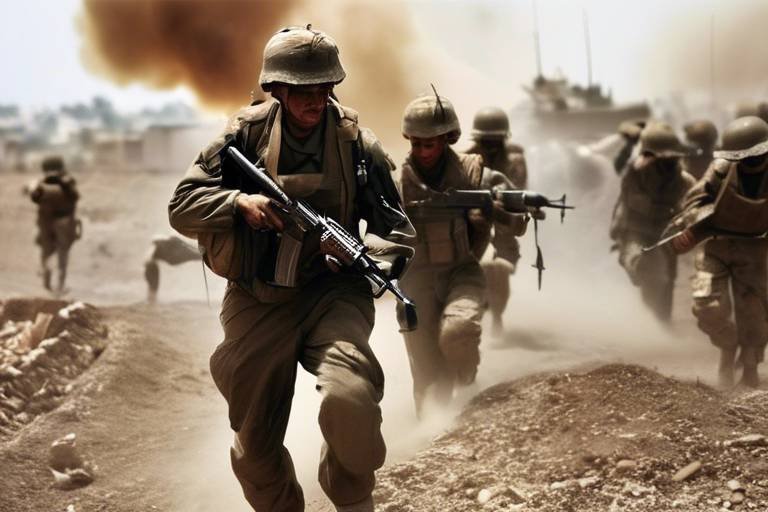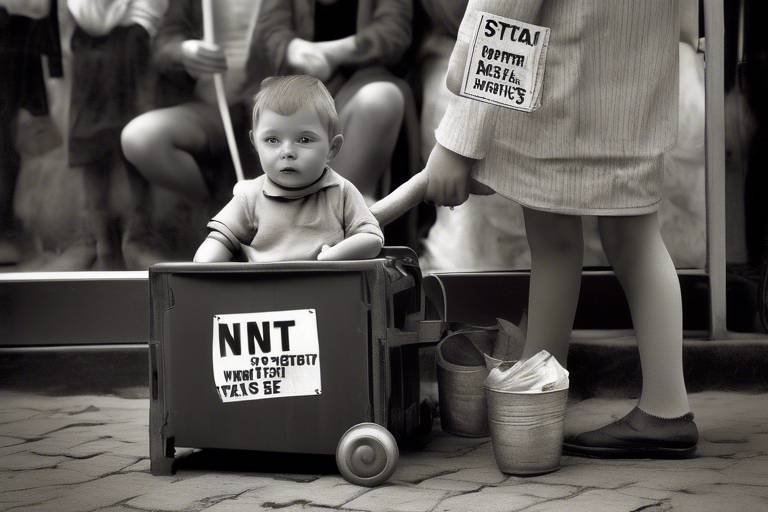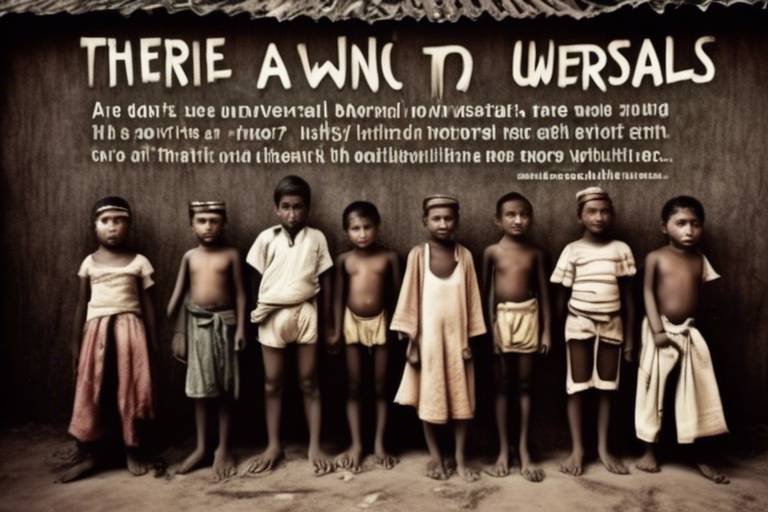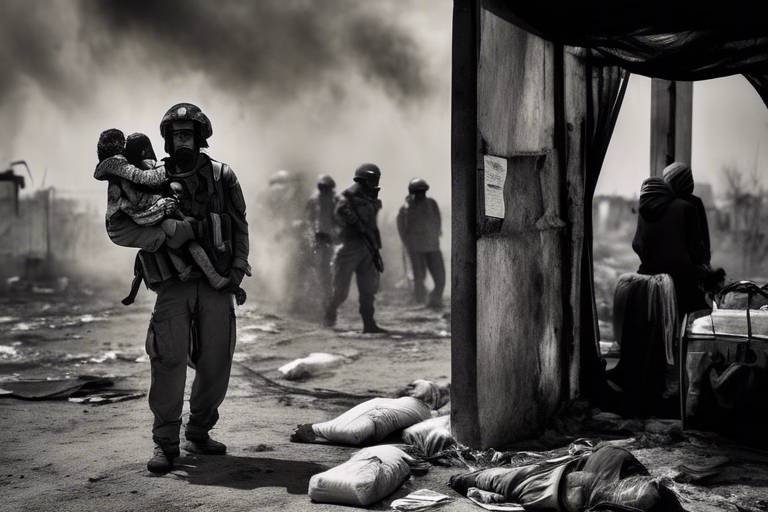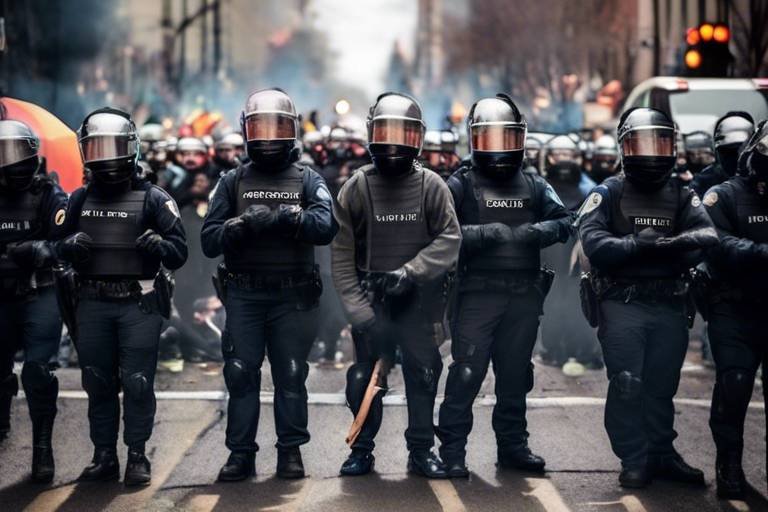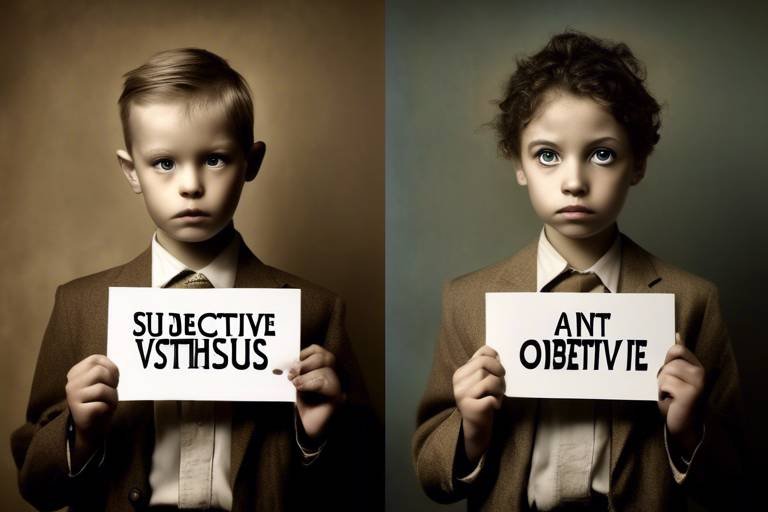Can War Be Ethically Acceptable?
The question of whether war can ever be ethically acceptable is one that has perplexed philosophers, politicians, and ordinary people alike for centuries. It’s a complex moral landscape, filled with conflicting perspectives and historical contexts that challenge our understanding of right and wrong. On one hand, we have the undeniable suffering and destruction that war brings, affecting not just soldiers but also innocent civilians caught in the crossfire. On the other hand, there are instances where war has been seen as a necessary evil, a means to achieve peace or protect human rights. So, can war truly be justified? Or is it an inherent evil that we must strive to eliminate from our world?
To explore this question, we must delve into various philosophical frameworks that attempt to address the morality of war. From the Just War Theory, which sets out specific criteria for justifying military action, to consequentialism, which evaluates the morality of actions based on their outcomes, the debate is rich and multifaceted. Each perspective offers insights but also raises further questions. For instance, if a war is fought to achieve a noble end, can the means used to achieve that end be justified? And what happens when the consequences of war are unpredictable, or worse, catastrophic?
Moreover, the evolution of warfare in the modern age, characterized by advanced technology and asymmetric conflicts, complicates our understanding of what is ethical in the context of armed conflict. With drones and cyber warfare, the traditional battlefield has transformed, making it difficult to apply age-old ethical principles. As we navigate through this intricate web of moral dilemmas, it becomes crucial to consider the implications of war on society and individuals alike. Are we prepared to bear the consequences of our decisions, or do we risk repeating the mistakes of the past?
As we examine these issues, it’s essential to recognize that the implications of war extend beyond the battlefield. They seep into our collective consciousness, shaping our values and beliefs about justice, peace, and human dignity. In a world where conflict seems inevitable, understanding the ethical dimensions of war is not just academic; it's vital for fostering a more peaceful future.
- What is the Just War Theory? The Just War Theory is a philosophical framework that outlines the conditions under which war can be morally justified, emphasizing principles such as just cause, proportionality, and discrimination between combatants and non-combatants.
- Can war ever be justified? Many argue that war can be justified under certain conditions, particularly when it is waged for a just cause, such as self-defense or protecting human rights.
- What are the ethical implications of modern warfare? Modern warfare presents unique ethical challenges, including issues related to technology, civilian casualties, and the psychological impact on soldiers.
- How do religious perspectives influence views on war? Different religious traditions offer varying insights into the ethics of war, with some advocating for peace and non-violence, while others may condone military action under specific circumstances.

The Just War Theory
The Just War Theory is a fascinating framework that seeks to navigate the murky waters of morality in warfare. It provides a set of principles that aim to determine when it is ethically permissible to engage in armed conflict. At its core, this theory is not just about declaring war; it's about understanding the conditions that make war justifiable. Imagine a scale where one side holds the weight of moral principles and the other, the weight of conflict. The balance is delicate, and the stakes are high.
One of the primary tenets of the Just War Theory is the concept of just cause. This principle asserts that a war can only be waged for reasons that are morally sound, such as self-defense against aggression or protecting innocent lives. Without a just cause, any military action can quickly devolve into mere aggression or imperialism. Think of it like a game of chess: you can only make a move if it serves a purpose, otherwise, you're just setting yourself up for defeat.
Another critical principle is proportionality. This means that the violence used in the war must be proportional to the injury suffered. In other words, if someone throws a punch, you can't respond with a nuclear bomb. It’s about maintaining a sense of balance and ensuring that the response is appropriate to the provocation. This principle is essential because it helps to prevent unnecessary suffering and destruction, reminding us that the consequences of war often ripple far beyond the battlefield.
Furthermore, the theory emphasizes the need for discrimination between combatants and non-combatants. In a just war, efforts must be made to protect civilians and avoid targeting those who are not actively participating in hostilities. This principle is crucial because it recognizes the humanity of individuals caught in the crossfire. It’s akin to a surgeon who must carefully operate without harming healthy tissue; the goal is to minimize collateral damage while addressing the root issue.
While the Just War Theory provides a structured approach to understanding the morality of war, it is not without its challenges. Critics often argue that the definitions of just cause, proportionality, and discrimination can be subjective and manipulated to justify aggressive actions. For instance, how does one determine what constitutes a just cause? Is it the opinion of the government, the populace, or an international body? This ambiguity can lead to a slippery slope where the principles are invoked to legitimize war rather than to prevent it.
In conclusion, the Just War Theory serves as a critical lens through which we can examine the ethical implications of warfare. It compels us to ask hard questions about the morality of our actions and the consequences they entail. As we navigate this complex landscape, we must remain vigilant and ensure that our pursuit of justice does not lead us down the path of further violence.
- What are the main principles of Just War Theory? The main principles include just cause, proportionality, and discrimination between combatants and non-combatants.
- Can war ever be truly justified? While the Just War Theory provides a framework for justification, the subjective nature of its principles often leads to debate.
- How does Just War Theory apply to modern conflicts? Modern conflicts often challenge the traditional interpretations of Just War Theory, particularly with issues like terrorism and asymmetrical warfare.

Consequentialism and War
When we dive into the murky waters of war ethics, one perspective that often surfaces is consequentialism. This philosophical approach suggests that the morality of an action is determined by its outcomes. In the context of war, this raises a provocative question: can the ends ever truly justify the means? For instance, if a war leads to peace and stability, does that make the violence and destruction it caused acceptable? It’s a complex puzzle that has puzzled philosophers and policymakers alike.
Consequentialism challenges us to weigh the potential benefits of military action against the inevitable harms it inflicts. Imagine a scenario where a country is facing an oppressive regime that violates basic human rights. A consequentialist might argue that intervening militarily could lead to a greater good: the liberation of oppressed citizens. Yet, the collateral damage—the loss of innocent lives, the destruction of infrastructure, and the long-term psychological impact on survivors—cannot be ignored. This perspective forces us to confront uncomfortable truths about the price of war.
To further illustrate the complexities involved, let’s consider a few key points:
- Short-term gains vs. long-term consequences: While military action may bring immediate relief, the long-term implications can be dire. Post-war societies often struggle with instability, resentment, and economic hardship.
- Disproportionate harm: In many conflicts, the most vulnerable populations bear the brunt of the consequences. This raises ethical questions about whether the potential benefits to a few justify the suffering of many.
- Unintended outcomes: Wars can spiral out of control, leading to unforeseen consequences that complicate the original intentions. The aftermath of interventions can sometimes create power vacuums, leading to further violence.
Another layer to consider is the utilitarian aspect of consequentialism, which emphasizes the greatest good for the greatest number. This principle can create a moral dilemma: should we prioritize the welfare of the majority, even if it means sacrificing the rights of a minority? This question is particularly relevant in the context of humanitarian interventions, where the goal is to protect human rights but the methods can lead to significant harm.
As we analyze the ethical landscape of war through the lens of consequentialism, it becomes clear that the implications of military action extend far beyond the battlefield. Decisions made in the heat of conflict can resonate through generations, shaping the future of nations and the lives of countless individuals. Therefore, it’s crucial for policymakers and military leaders to engage in deep reflection and consider the broader consequences of their actions.
In conclusion, while consequentialism provides a framework for evaluating the morality of war based on outcomes, it also highlights the inherent complexities and ethical dilemmas involved. The challenge lies in balancing the potential benefits of military action with the inevitable costs, ensuring that we do not lose sight of our moral compass in the pursuit of a perceived greater good.
- What is consequentialism? Consequentialism is a philosophical approach that assesses the morality of actions based on their outcomes or consequences.
- How does consequentialism apply to war? In the context of war, consequentialism raises questions about whether the potential benefits of military action justify the harm and destruction it causes.
- What are some criticisms of consequentialism? Critics argue that consequentialism can lead to morally questionable decisions, such as sacrificing the rights of a minority for the sake of the majority.

Utilitarianism and Military Action
Utilitarianism, a philosophical approach that evaluates actions based on their outcomes, presents a compelling yet complicated perspective on military action. At its core, utilitarianism posits that the morality of an action is determined by its ability to produce the greatest good for the greatest number. This principle becomes particularly contentious when applied to the realm of war, where the stakes are incredibly high and the consequences often devastating. Can we truly justify the destruction and loss of life in the name of a greater good? This question lies at the heart of utilitarian ethical considerations regarding military action.
To break it down further, utilitarianism prompts us to weigh the potential benefits of military action against the inevitable harms. For instance, a government might argue that intervening in a conflict can prevent a larger humanitarian crisis, thereby saving countless lives. However, this raises a fundamental dilemma: what if the military action leads to more suffering than it alleviates? The challenge lies in accurately predicting the outcomes of war, as history has shown us that even well-intentioned interventions can spiral into chaos, leading to unforeseen consequences.
Consider the following scenarios:
- Intervention for Humanitarian Reasons: A nation decides to intervene in a country where genocide is occurring. The justification is that military action can save lives. Yet, what if the intervention results in prolonged conflict, displacing millions and causing a humanitarian disaster?
- Preemptive Strikes: A country may launch a preemptive strike against another nation, arguing that it is preventing a future threat. However, this action could escalate tensions and lead to a larger war, ultimately resulting in more casualties than if no action had been taken.
Utilitarianism also raises questions about the moral responsibility of leaders who make decisions about military action. Should they be held accountable for the outcomes of their decisions, especially when those outcomes are difficult to predict? This uncertainty complicates the ethical landscape, as leaders must navigate the fine line between acting in the interest of their citizens and causing harm to others. The utilitarian approach thus demands a careful balancing act, where the potential for good must always be weighed against the potential for harm.
Moreover, the utilitarian perspective can lead to a slippery slope where the ends are used to justify questionable means. For example, if a government believes that a particular military action will yield significant benefits, it may overlook the immediate suffering caused by that action. This can create a dangerous precedent where violence is seen as an acceptable solution to complex problems, undermining the very principles of peace and diplomacy.
In conclusion, while utilitarianism provides a framework for analyzing military action through the lens of outcomes, it is fraught with ethical dilemmas. The challenge lies not only in predicting the consequences of war but also in ensuring that the pursuit of the greater good does not come at the expense of fundamental human rights and dignity. As we navigate the complexities of modern warfare, it is crucial to engage in thoughtful discussions about the moral implications of our actions, aiming to strike a balance between utilitarian principles and the inherent value of human life.
Q: What is utilitarianism?
A: Utilitarianism is a philosophical theory that evaluates the morality of actions based on their outcomes, specifically aiming to achieve the greatest good for the greatest number of people.
Q: How does utilitarianism apply to military action?
A: In the context of military action, utilitarianism examines whether the benefits of intervention outweigh the potential harms, raising ethical questions about the justification of war.
Q: Can the ends justify the means in war?
A: This is a contentious issue; while utilitarianism suggests that positive outcomes can justify military action, it also warns against the dangers of overlooking the immediate suffering caused by such actions.
Q: What are some criticisms of utilitarianism in military contexts?
A: Critics argue that utilitarianism can lead to justifying harmful actions and can oversimplify complex moral situations by focusing solely on outcomes rather than the inherent value of human life.

Humanitarian Interventions
Humanitarian interventions often emerge as a contentious topic in the discourse surrounding war and ethics. These interventions are typically justified on the basis of protecting human rights and alleviating suffering in situations of extreme violence or oppression. However, the moral landscape is complex and riddled with dilemmas. On one hand, the intention to save lives and uphold dignity is noble; on the other, the act of intervening can infringe on a nation's sovereignty and lead to unintended consequences that may exacerbate the very issues they aim to resolve.
Let’s break down some of the key aspects of humanitarian interventions:
- Justification for Intervention: Proponents argue that when a government fails to protect its citizens or actively engages in atrocities, the international community has a moral obligation to intervene.
- Potential for Unintended Consequences: History shows that interventions can lead to prolonged conflicts, destabilization, and even greater humanitarian crises. For instance, the aftermath of interventions in places like Libya has raised questions about the long-term effectiveness of such actions.
- Ethical Dilemmas: The decision to intervene can be influenced by political motives, raising concerns about whether actions are genuinely humanitarian or if they are veiled attempts at pursuing national interests.
One of the most notable examples of humanitarian intervention is the NATO-led operation in Kosovo in 1999. This intervention aimed to stop ethnic cleansing and protect the Albanian population. While many hailed it as a successful humanitarian effort, critics pointed out the lack of UN approval and the subsequent instability that followed. This raises an important question: Can we truly separate ethical motivations from political agendas in such interventions?
The debate continues, with some advocating for a strict framework to guide humanitarian interventions, ensuring they remain focused on human rights rather than geopolitical strategies. Others argue for a more cautious approach, emphasizing the importance of respecting sovereignty and exploring diplomatic solutions before resorting to military action. As we navigate this complex moral terrain, it becomes clear that humanitarian interventions are not merely black and white; they are steeped in shades of gray that demand careful consideration and ethical scrutiny.
Q1: What is a humanitarian intervention?
A humanitarian intervention is a military action taken by a state or group of states to prevent or stop widespread suffering or human rights abuses in another state, typically without the consent of the latter.
Q2: Are humanitarian interventions always ethically justified?
Not necessarily. While the intent may be to protect human rights, the consequences can sometimes lead to further suffering, raising ethical dilemmas regarding sovereignty and the effectiveness of such actions.
Q3: Can humanitarian interventions lead to positive outcomes?
Yes, there are instances where interventions have successfully protected populations and restored peace. However, these outcomes are not guaranteed and must be evaluated on a case-by-case basis.
Q4: How do international laws regulate humanitarian interventions?
International laws, including the Responsibility to Protect (R2P) doctrine, provide a framework for when and how humanitarian interventions may occur, emphasizing the need for a just cause, proportionality, and last resort.

Case Studies of Justified Wars
When discussing the ethical acceptability of war, examining specific case studies can illuminate how the principles of just war theory have been applied in real-world scenarios. One prominent example is World War II, which is often cited as a war fought for a just cause. The aggression of Nazi Germany and its expansionist policies posed a direct threat to global peace and security. The Allied powers, led by the United States, the United Kingdom, and the Soviet Union, justified their military actions under the premise of stopping tyranny and protecting human rights. This case highlights the principle of just cause, as the Allies aimed to restore freedom and prevent further atrocities.
Another significant case is the Gulf War of 1990-1991, which was initiated to expel Iraqi forces from Kuwait. The United Nations endorsed military intervention, emphasizing that Iraq’s invasion violated international law and posed a threat to regional stability. Here, the principle of proportionality comes into play, as the response was measured and aimed at restoring the status quo rather than pursuing territorial expansion or revenge. The coalition forces operated under the banner of legitimacy provided by the UN, illustrating how international consensus can lend moral weight to military action.
However, not all wars deemed justified are free from controversy. The Vietnam War, for instance, was initially justified by the U.S. government as a necessary action to prevent the spread of communism. Yet, as the war progressed, many questioned whether the means employed, including widespread bombing and the use of chemical agents, were proportional to the ends sought. The heavy civilian casualties and the long-term consequences for both Vietnam and U.S. soldiers have led to a reevaluation of its ethical justification.
In addition to these historical examples, the ongoing conflict in Syria raises complex ethical questions surrounding humanitarian intervention. Various nations have debated the morality of intervening in a civil war that has resulted in significant human suffering. While some argue that intervention is necessary to protect innocent civilians, others caution against potential unintended consequences, such as further destabilization or prolonged conflict. This case illustrates the challenges of applying just war principles in situations where the lines between combatants and non-combatants are blurred.
In conclusion, analyzing these case studies reveals that the ethical acceptability of war is often contingent upon the specifics of each situation. While principles like just cause and proportionality provide a framework for justification, the complexities of real-world conflicts frequently challenge these ideals. The lessons learned from these wars continue to influence contemporary discussions about military intervention and the moral responsibilities of nations in times of crisis.
- What is just war theory? Just war theory is a philosophical framework that outlines the conditions under which war can be morally justified, focusing on principles like just cause, proportionality, and discrimination.
- Can war ever be ethically justified? While some argue that war can be justified under certain conditions, others believe that non-violence should always be the preferred approach.
- What are the key principles of just war theory? The key principles include just cause, proportionality, discrimination between combatants and non-combatants, and the intention behind the war.
- How do historical case studies inform our understanding of war ethics? Historical case studies provide real-world examples of how just war principles have been applied and challenged, helping to shape contemporary discussions on the ethics of war.

Critiques of Just War Theory
The Just War Theory has long been a framework for evaluating the morality of war, but it's not without its critics. Many argue that this theory often serves as a convenient justification for violence rather than a genuine ethical guideline. One major critique is that the principles of just cause, proportionality, and discrimination can be overly subjective. For instance, who determines what constitutes a "just cause"? In many cases, nations may claim self-defense or humanitarian reasons as justifications for military action, but these claims can be manipulated to fit political agendas. This leads to the question: can we truly trust that the reasons given for war are as noble as they are portrayed?
Moreover, critics point out that the Just War Theory often fails to address the realities of modern conflict. The rise of asymmetrical warfare, where state and non-state actors engage in combat, complicates the application of traditional just war principles. In such scenarios, distinguishing between combatants and non-combatants becomes increasingly difficult, raising ethical dilemmas about collateral damage. For example, drone strikes, which are often justified under the guise of precision and reduced risk to soldiers, have resulted in significant civilian casualties. This contradiction challenges the very foundation of the theory, as it appears to prioritize military objectives over human life.
Another significant critique is the notion of moral relativism inherent in the Just War Theory. Different cultures and societies may interpret the principles of just war in vastly different ways. This raises an important question: if the moral framework is not universally accepted, can it truly be considered a reliable guide? Critics argue that this relativism can lead to inconsistencies in how wars are justified and conducted, further muddying the waters of ethical warfare.
Furthermore, the idea that war can ever be truly "just" is challenged by pacifist perspectives, which argue that any form of violence is inherently immoral. This viewpoint suggests that the Just War Theory may simply provide a façade of legitimacy for actions that, at their core, are violent and destructive. The dilemma is clear: if we accept that war can be justified under certain conditions, do we not also risk normalizing violence as a solution to conflict?
In summary, while the Just War Theory provides a framework for discussing the ethics of warfare, it is fraught with limitations and challenges. Its principles can be misused, interpreted subjectively, and may not hold up in the face of modern warfare's complexities. As we navigate the moral landscape of armed conflict, it is essential to critically examine these critiques and consider the implications they have on our understanding of war's ethical acceptability.
- What is the Just War Theory? The Just War Theory is a philosophical framework that outlines the conditions under which war can be morally justified, emphasizing principles such as just cause, proportionality, and discrimination.
- Why do critics oppose the Just War Theory? Critics argue that it can be misused to justify violence, lacks universal acceptance, and fails to adequately address the complexities of modern warfare.
- What are some examples of modern warfare challenges? Asymmetrical warfare, drone strikes, and the difficulty of distinguishing between combatants and non-combatants are significant challenges that complicate traditional just war principles.
- Can war ever be justified? This is a contentious question, with varying perspectives. Some argue that under specific conditions, war can be justified, while others maintain that any form of violence is inherently immoral.

Pacifism and Its Arguments
Pacifism, at its core, is the belief that violence, including war, is morally unacceptable. This philosophy challenges the very foundation of our understanding of conflict and raises profound questions about the nature of human interaction. Imagine a world where disputes are settled through dialogue rather than destruction; pacifists advocate for this ideal. They argue that resorting to violence only perpetuates a cycle of harm, creating more suffering rather than resolving the underlying issues. But what does it mean to be a pacifist in a world rife with conflict?
There are several strands of pacifist thought, each offering unique insights into the arguments against war. Some pacifists, often referred to as absolute pacifists, hold a firm stance against any form of violence, even in self-defense. They argue that engaging in violence, regardless of the justification, taints the moral fabric of society and diminishes our humanity. Others may adopt a more conditional pacifism, suggesting that while war is generally wrong, there might be extreme circumstances where non-violent responses fail, and intervention becomes necessary. However, even in these cases, the emphasis remains on minimizing harm and seeking peaceful resolutions.
One of the most compelling arguments in favor of pacifism is the idea that war often leads to unintended consequences that can exacerbate the very problems it aims to solve. For instance, consider the aftermath of conflicts where intervention was deemed necessary. The fallout often includes loss of life, displacement of populations, and long-term destabilization. In this context, pacifists question whether the short-term goals of military action are worth the long-term suffering it can cause. They argue that instead of military solutions, we should focus on diplomacy, education, and economic development to address the root causes of conflict.
Furthermore, pacifism is not merely a passive stance; it is an active commitment to promoting peace and justice through non-violent means. Many pacifists engage in activism, advocating for policies that prioritize human rights and social justice. They emphasize the importance of understanding and addressing the grievances that lead to conflict, rather than simply responding with force. This proactive approach can foster a culture of peace, encouraging societies to resolve differences through communication and cooperation.
However, pacifism is not without its critics. Some argue that in the face of tyranny or aggression, pacifism can be seen as a form of complicity. They question whether it is ethical to stand by while injustices occur, suggesting that sometimes, military intervention is necessary to protect the innocent. This brings us to a critical intersection of ethics and pragmatism: can one remain morally steadfast in their belief against violence while confronting the harsh realities of a violent world?
To further illustrate the complexities of pacifism, let's consider a few key arguments:
- Historical Precedents: Many pacifists point to historical examples where non-violent movements have successfully achieved social change, such as Gandhi's struggle for Indian independence and Martin Luther King Jr.'s civil rights movement. These examples serve as powerful reminders of the potential for peaceful resistance.
- Moral Integrity: Advocates argue that maintaining a commitment to non-violence reflects a deeper moral integrity, aligning with the belief that every human life is valuable and should be respected.
- Psychological Impact: Engaging in violence can have detrimental effects on individuals and societies, fostering a culture of fear and hostility rather than understanding and compassion.
In conclusion, while pacifism presents a compelling argument against the ethics of war, it also invites us to reflect on our values and the choices we make in times of conflict. It challenges us to envision a world where dialogue prevails over destruction, urging us to consider the profound implications of our actions. As we navigate the complexities of modern conflict, the principles of pacifism may offer a guiding light, reminding us that the path to peace is often paved with understanding and compassion.
- What is pacifism? Pacifism is the belief that violence and war are morally unacceptable and that conflicts should be resolved through peaceful means.
- Are there different types of pacifism? Yes, there are absolute pacifists who reject all forms of violence, and conditional pacifists who may accept violence in extreme situations.
- How does pacifism relate to modern conflicts? Pacifism encourages dialogue and non-violent solutions to conflicts, emphasizing the importance of addressing root causes rather than resorting to military action.

Religious Perspectives on War
The intersection of religion and war is a profound topic that evokes strong emotions and diverse opinions. Many religious traditions offer insights that either justify or condemn the act of war. For instance, in Christianity, the concept of a "just war" is often discussed, where theologians like Augustine and Aquinas have formulated criteria under which war can be deemed morally acceptable. They argue that war may be justified if it is waged for a **just cause**, such as self-defense or the protection of the innocent. However, the teachings of Jesus emphasize **peace** and **forgiveness**, leading many Christians to advocate for pacifism instead.
Similarly, in Islam, the concept of **Jihad** encompasses both a personal spiritual struggle and the duty to defend the community. Many Muslims believe that engaging in war can be justified under specific conditions, such as defending one's faith or homeland. However, the Quran also emphasizes the importance of mercy and the sanctity of life, which complicates the justification of violence. This duality can lead to differing interpretations among Islamic scholars, resulting in a spectrum of beliefs regarding the morality of war.
Judaism also presents a nuanced view on war. The Hebrew Bible recounts numerous instances of war, often portraying them as divinely sanctioned. Yet, Jewish teachings also stress the importance of **peace** and **justice**. The Talmud suggests that one should always seek peaceful resolutions before resorting to violence. This perspective highlights the tension between the historical narratives of conflict and the ethical imperatives of compassion and justice.
In contrast, many Eastern religions, such as Buddhism, take a strong stance against violence. The fundamental teachings of Buddhism advocate for **ahimsa** (non-violence), which posits that causing harm to others, even in the name of a just cause, is inherently wrong. This perspective challenges the notion that war can ever be ethically acceptable, as it prioritizes the sanctity of all life. Buddhist leaders often emphasize meditation and dialogue as tools for conflict resolution, promoting peace over warfare.
Ultimately, the religious perspectives on war reflect a complex tapestry of beliefs that vary not only between different faiths but also within them. Each tradition grapples with the moral implications of violence and the quest for peace. Understanding these diverse viewpoints can enrich our discourse on the ethical dimensions of war, compelling us to consider whether armed conflict can ever be justified or if we should strive for peaceful resolutions in all circumstances.
- Can war ever be justified according to religious teachings? Yes, many religions have criteria under which war can be deemed justifiable, but interpretations vary widely.
- What role does pacifism play in religious perspectives on war? Pacifism is a significant stance in many religious traditions, advocating for non-violence and peaceful resolutions.
- How do different religions view the concept of Jihad? In Islam, Jihad can refer to both a personal spiritual struggle and a duty to defend the community, but interpretations can differ.
- Do all religions advocate for peace? While many emphasize peace, the historical context of each religion influences its teachings on war and conflict.

Modern Warfare and Ethical Dilemmas
In today's world, modern warfare has transformed dramatically, challenging our traditional notions of ethics in conflict. Gone are the days when wars were fought on open battlefields between clearly defined armies. Now, we face a complex web of asymmetrical warfare, cyber-attacks, and the use of autonomous weapons, all of which raise profound ethical questions. How do we justify actions taken in a world where the lines between combatants and civilians are increasingly blurred? This is a dilemma that not only affects military strategists but also touches the moral fabric of society.
One of the most pressing ethical issues in modern warfare is the use of drone strikes. While drones can minimize risk to military personnel, they also raise significant moral concerns. For instance, the ability to conduct strikes from thousands of miles away can create a detachment from the consequences of violence. This detachment may lead to a lower threshold for engaging in conflict, as decision-makers may not fully grasp the human cost of their actions. The potential for collateral damage, where innocent lives are lost, complicates the justification of such actions. Are we, as a society, willing to accept that some civilian lives might be deemed acceptable losses in the pursuit of military objectives?
Furthermore, the rise of cyber warfare introduces a new dimension to ethical considerations in conflict. Cyber-attacks can disrupt critical infrastructure, cause economic chaos, and even lead to loss of life without a single shot being fired. The anonymity and distance provided by technology can make it easier for nations to engage in hostile actions without facing immediate repercussions. This raises the question: Does the lack of physical presence in warfare diminish our ethical responsibilities? The answer is not straightforward, as the consequences of cyber warfare can be just as devastating as traditional forms of conflict.
Another significant aspect of modern warfare is the use of autonomous weapons systems. These machines can make life-and-death decisions without human intervention, leading to a debate about accountability. If an autonomous drone mistakenly targets a civilian area, who is responsible? Is it the programmer, the military officer who deployed it, or the government that authorized its use? The complexity of assigning blame in these scenarios poses a serious ethical challenge. As technology continues to advance, we must ask ourselves: Are we prepared to relinquish moral agency to machines?
In addition to these technological advancements, modern warfare often involves non-state actors, such as terrorist organizations and militias. These groups may not adhere to traditional rules of engagement, making it difficult for conventional military forces to respond ethically. The presence of these actors complicates the battlefield, blurring the lines between combatants and non-combatants. This leads to an ongoing debate about the legality and morality of targeting such groups. Are we justified in using overwhelming force against entities that operate outside the law, or does this approach risk perpetuating a cycle of violence?
As we navigate these ethical dilemmas, it's crucial to engage in open dialogues about the implications of modern warfare. The stakes are high, and the consequences of our actions can reverberate for generations. We must consider not only the immediate effects of military actions but also their long-term impacts on global stability and human rights. In a world where the nature of conflict is constantly evolving, our ethical frameworks must adapt accordingly.
- What is modern warfare?
Modern warfare refers to the contemporary methods of conducting armed conflict, including the use of technology, cyber warfare, and asymmetric tactics. - Why are ethical dilemmas more pronounced in modern warfare?
The increasing complexity of warfare, including the use of drones and cyber attacks, has made it harder to define clear moral responsibilities and consequences. - How does technology impact the ethics of war?
Technology can create distance between decision-makers and the battlefield, potentially leading to a diminished sense of accountability for the consequences of military actions. - What are the challenges of engaging with non-state actors in conflict?
Non-state actors often do not follow traditional rules of engagement, complicating the ethical considerations of military response.
Frequently Asked Questions
- What is the Just War Theory?
The Just War Theory is a philosophical framework that outlines the moral conditions under which war can be considered justifiable. It emphasizes principles like having a just cause, proportionality in response, and the importance of distinguishing between combatants and non-combatants. Essentially, it's about ensuring that if war must occur, it is fought for the right reasons and in the right way.
- Can war ever be morally justified?
This is a hotly debated question! Many believe that war can be justified under certain conditions, such as self-defense or protecting human rights. However, others argue that the devastation and suffering caused by war make it inherently unacceptable. It's a complex issue that often depends on individual perspectives and the specific context of each conflict.
- What is consequentialism in relation to war?
Consequentialism is an ethical theory that judges actions based on their outcomes. In the context of war, this perspective raises the question: do the potential benefits of a military action outweigh the harm it causes? It challenges us to think critically about whether the ends can truly justify the means when lives are at stake.
- How does utilitarianism apply to military action?
Utilitarianism is all about maximizing happiness and minimizing suffering for the greatest number of people. When applied to military action, it complicates the ethical justification for war, as one must weigh the potential good against the inevitable harm and suffering that conflict brings. It's a balancing act that often leads to difficult moral dilemmas.
- What are humanitarian interventions?
Humanitarian interventions are military actions taken to prevent or stop human rights abuses. While they may be well-intentioned, they raise significant ethical questions about sovereignty and the potential for unintended consequences. It's a bit like trying to help a friend in a tough situation—you want to do good, but you have to be careful not to make things worse.
- What are some historical examples of justified wars?
Analyzing historical wars that are often deemed justified, such as World War II, can provide valuable insights into the application of just war principles. These case studies help us understand the complexities of ethical decision-making in conflict and the various factors that contribute to the perception of a war as just or unjust.
- What critiques exist regarding the Just War Theory?
Critics of the Just War Theory argue that it is frequently misused to legitimize violence and warfare. They point out the challenges and limitations of applying this ethical framework to contemporary conflicts, suggesting that it may not adequately address the realities of modern warfare and the moral complexities involved.
- What is pacifism, and how does it relate to war?
Pacifism is the belief that violence and war are inherently wrong, advocating for non-violent solutions to conflicts. Pacifists challenge the notion that war can ever be ethically acceptable, promoting the idea that there are always alternatives to violence, even in the face of aggression. It's a perspective that encourages deep reflection on the morality of our choices.
- How do religious perspectives influence views on war?
Many religions offer unique insights into the ethics of war, with teachings that can either condone or condemn violence. Understanding these diverse perspectives can enrich the discussion on war's moral acceptability and highlight the varied beliefs that shape our views on conflict and peace.
- What modern challenges complicate the ethics of war?
The evolution of warfare, especially with advancements in technology and the rise of asymmetrical conflicts, presents new ethical dilemmas. Issues like drone warfare and cyber attacks complicate traditional views on the morality of war, making it crucial to adapt our ethical frameworks to address these contemporary challenges.

